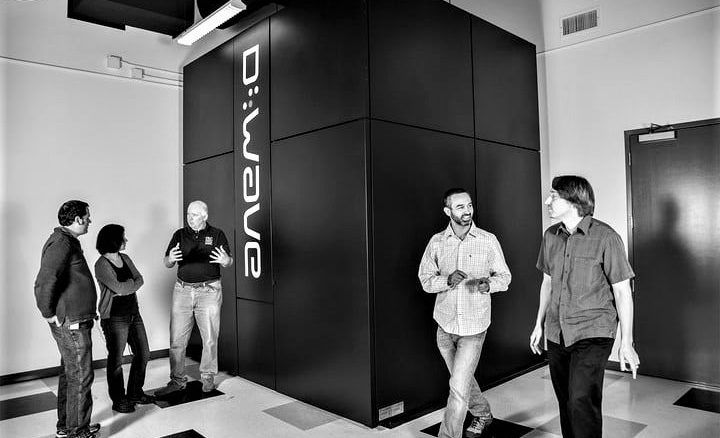
Quantum systems will not replace traditional supercomputers anytime soon but for certain types of simulations, they will be far more efficient and scalable than classical machines, at least according to CEO of quantum computer maker D-Wave, Vern Brownell.
This is a more reserved statement than one might expect from the head of company that to date has taken around $220 million since its inception in 1999, but Brownell says that a burgeoning cloud business and evolving software stack to allow ease of use place D-Wave on the cusp of becoming one of the most important technologies on the planet.
We have been covering the use cases for quantum systems over the last several years, which include a range of optimization and routing problems for companies like Volkswagen, but the real proof of quantum’s potential prowess lies in exacting results from quantum simulations—namely quantum monte carlo based problems. It is in this spectrum where classical computers will run out of steam, hitting a scalability wall and maxing out energy costs and time to result—and where the real opportunity lies for D-Wave, assuming at least that the applications in materials science, machine learning, drug discovery, fraud detection, and other promising areas are attractive enough in quantum to get people to rethink the decades of work they’ve done on traditional systems.
So why are quantum simulations the key to future growth for D-Wave and what would make quantum systems compelling enough to invest time and effort into a new way of doing things, especially in mission critical areas? The answer has just as much to do with the applications as it does with how users will access and interact with D-Wave systems.
The ROI of quantum simulations over traditional systems might be clearer than some other applications D-Wave has proven over the years, mostly because traditional systems are hitting a point where they simply can’t tackle these problems.
With classical systems it a massively time and energy-consuming task to the point that scaling such problems is too inefficient, even if the calculations are not particularly complex. Using quantum systems to simulate quantum systems is far more efficient than brute forcing it with accelerators—something that would be greatly aided if more users could tap into these capabilities without buying and tending to a quantum system (access via cloud) and if they could interface with those machines without understanding the intricacies of quantum mechanics. This is what D-Wave is banking on. What it is not counting on, however, is a complete replacement of classical systems anytime soon.
“Classical computing will co-exist with quantum in the coming decades. I don’t think we have a replacement for all forms of classical computing but quantum computers will be the most suitable for particular applications. There will be a number of different computing models; just as we have CPUs and GPUs today, we can think of quantum systems being complementary in the same way for certain application types.”
Today, quantum computers can solve any classical problem; they are universal classically but there is not yet a universal quantum machine,” Brownell adds.
Even as a “co-processor” of sorts for some problems that are best suited to traditional systems, D-Wave sees enough of an opportunity to keep pushing into new spaces. Interestingly, one of the major areas of investment at the company is in machine learning. We wrote recently about D-Wave’s new Quadrant business unit and Brownell says they don’t look at neural network algorithms as a threat to what quantum has to do in expensive hardware and software but as an opportunity.
“As quantum capabilities scale up the best performing option for some types of deep learning will eventually be fueled by quantum computers,” Brownell tells The Next Platform. “So if you don’t have a quantum system in the loop they won’t perform as well as a pure neural network approach.” More specifically he says that they are working more logic into neural network training to do more with less training data. “We are blending logic with discriminative learning which we think will create more powerful models,” he says.
In the here and now, however, GPU acceleration on traditional systems is the preferred method of training. For D-Wave to be able to demonstrate its success over this at any scale means making the tools available. Brownell hinted that the company’s cloud access strategy is going to firm up in 2018, opening quantum simulations to a much wider audience. As we have written in the past, Rigetti and IBM both have cloud offerings tied to their own quantum simulators. D-Wave’s claim to glory is that they have actual machines installed in customer datacenters. For a tech that requires some serious capital and brainpower, the cloud might be the only path to wide quantum adoption, even if they have competition from other quantum cloud contenders.
What really makes the difference is the software tooling and developer support. D-Wave recently hired Dr. Alan Baratz to lead software development efforts. He is known for building Java into a major platform during his Sun days and has been tasked with pushing D-Wave programming tools to a much larger base through familiar interfaces and tools that can intelligently and seamlessly decide how quantum and traditional system elements chew on particular aspects of an application.
“We will develop a scalable cloud business and that is important and create at the same time a developer ecosystem. That’s how Nvidia started when it salted the earth with GPUs. We want to put quantum computing in reach of developers, we are executing on faster and faster machines, and being early in the market, finding visionary investors will allow us the IP head start that will let us grow into one of the most important tech companies on the planet,” Brownell concludes.
We are set to follow up with Brownell in the near future to talk about the innovator’s dilemma and what it means to be first with a completely new technology as it relates to quantum computing startups. This is an especially interesting topic for Brownell who paved the way earlier in his career at Goldman Sachs for what was essentially a hypervisor for running mission critical partitioned workloads at scale well before it was commercialized widely. Being first had its advantages but ultimately the market exploded after the initial legwork.
Despite D-Wave’s solid story, quantum is still anyone’s market—at least for now.




